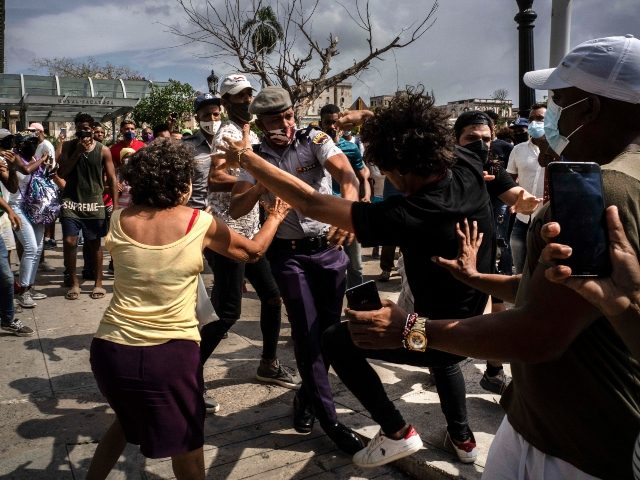The Spanish publication Diario de Cuba revealed on Friday that Spain’s economic records show sales of more than 1.2 million Euros ($1.4 million) to the communist Castro regime in military equipment, including automatic weapons.
The figure represents double the amount of such equipment as what Spain sold Cuba in 2019.
Spain’s, and Europe’s, contributions to the Communist Party of Cuba have returned to the spotlight in the aftermath of protests erupting nationwide against the 62-year-old regime, which in turn inspired Havana to retaliate with disproportionate violence. Peaceful protests began on Sunday in dozens of cities in every province of Cuba, featuring Cubans waving American flags, chanting “freedom,” and calling for an end to communism. President Miguel Díaz-Canel addressed the protests in a speech on Sunday issuing an “order of combat” for civilians, urging them to attack the protesters physically if seen in their neighborhoods.
Reports throughout the week indicate that protests have continued nationwide. Footage of those protests has diminished, however, as the Cuban regime shut down the internet and targeted VPNs Cubans have used to override the shutdown. The little that has trickled out indicates a nationwide campaign of violence against anyone suspected of supporting the protests. Videos have surfaced from sources on the island showing armed officers opening fire into crowds of protesters, prompting protesters to attempt to defend themselves with rocks. Eyewitnesses have reported door-to-door raids of armed officers looking for people who marched for freedom on Sunday, in some cases resulting in gunfire in civilian homes. Other videos have also indicated the mass mobilization of pro-regime civilians, including the busing in of dozens of people armed with sticks and metal rods to repress peaceful protests in Havana.
The Diario de Cuba report suggests that at least some significant percentage of the guns and other weapons used against unarmed, peaceful protesters this week in Cuba came from Spain. According to the report, the million-dollar sum went to Cuban purchases of “guns and automatic firearms;” “pyrotechnics, combustibles, and related substances;” “oxidants, binders, additives, and precursors.” The statistics are from data published by the Spanish Ministry of Industry, Commerce, and Tourism.
The list of firearms Spain sold Cuba includes “rifles, revolvers, pistols, machine guns, silencers,” and auxiliary equipment like chargers and optical visors, according to the online newspaper.
The communist regime depends heavily on trade with Spain, and the European Union in general, for its survival. Spain is one of Cuba’s top three trade partners, alongside its colony, Venezuela, and its patron state, China. The European Union as a whole represents a significant percentage of Cuba’s revenue, particularly through supporting its tourism industry.
“Relations between the European Union and Cuba are based on a political dialogue that promotes cooperation, respect for human rights, the modernisation of the Cuban economy, and the development of joint responses to global challenges,” the official EU website reads in part. “Both the EU and Cuba seek to strengthen the United Nations as the core of the multilateral system and to support the strategic partnership between the European Union and Latin American and the Caribbean.”
These ties have called into question Europe’s commitment to universal human rights norms, particularly in light of its tepid response to the protests this week.
Spanish President Pedro Sánchez, of the Socialist Workers’ Party of Spain (PSOE), has repeatedly refused this week to refer to Cuba as a dictatorship. European Union foreign policy leader Josep Borrell similarly refused to condemn the Castro regime as a dictatorship this week, instead simply asking the government to “listen to the protests of discontent by the demonstrators,” without any indication that the EU would consider modifying its relationship to the country given the scenes of oppression surfacing there.
“Nobody can doubt that human rights are a central element of our Political Dialogue and Cooperation Agreement with Cuba,” Borrell had said just a month ago.
Outside of the elected government of Spain, the royal family has made questionable policy decisions regarding Cuba. At the top of that list was a visit by King Felipe VI and Queen Letizia’s visit to Havana – the first by Spanish monarchs ever – in 2019 to observe the 500th anniversary of the founding of Havana. The visit resulted in mass arrests and disappearances of Cuban dissidents that neither the king nor queen objected to while on the island.
Spanish conservatives have been outliers in the country’s attitude towards Cuba. The Popular Party (PP), a center-right party currently governing Madrid, lit up the heart of the city in Cuban flag colors in solidarity with the protesters this week.
The PP, under then-President Mariano Rajoy, made no significant changes to Spain’s policy towards Cuba while in power for much of the past decade, however.
Vox, a relatively new populist conservative party in the country, made more definitive remarks against the regime this week, asking the world to “neutralize” the Castro dictatorship – and calling it as such – in response to the protests.
“We must end decades of oppression, that the Castroites abandon Cuba. We have a wall, like that of Berlin, that has not let them prosper,” Vox Madrid spokeswoman Rocío Monasterio said this week. “We are with you, with the Cuban people, and we are ashamed of the Sánchez government that has not been capable of going out and saying anything or even supporting a people that is being oppressed, that is Sánchez’s socialism.”
Vox is urging Spain to make a “public and resounding denunciation of the repression of peaceful demonstrations, the limitation of freedom of expression, and the violation of human rights in Cuba.”

COMMENTS
Please let us know if you're having issues with commenting.